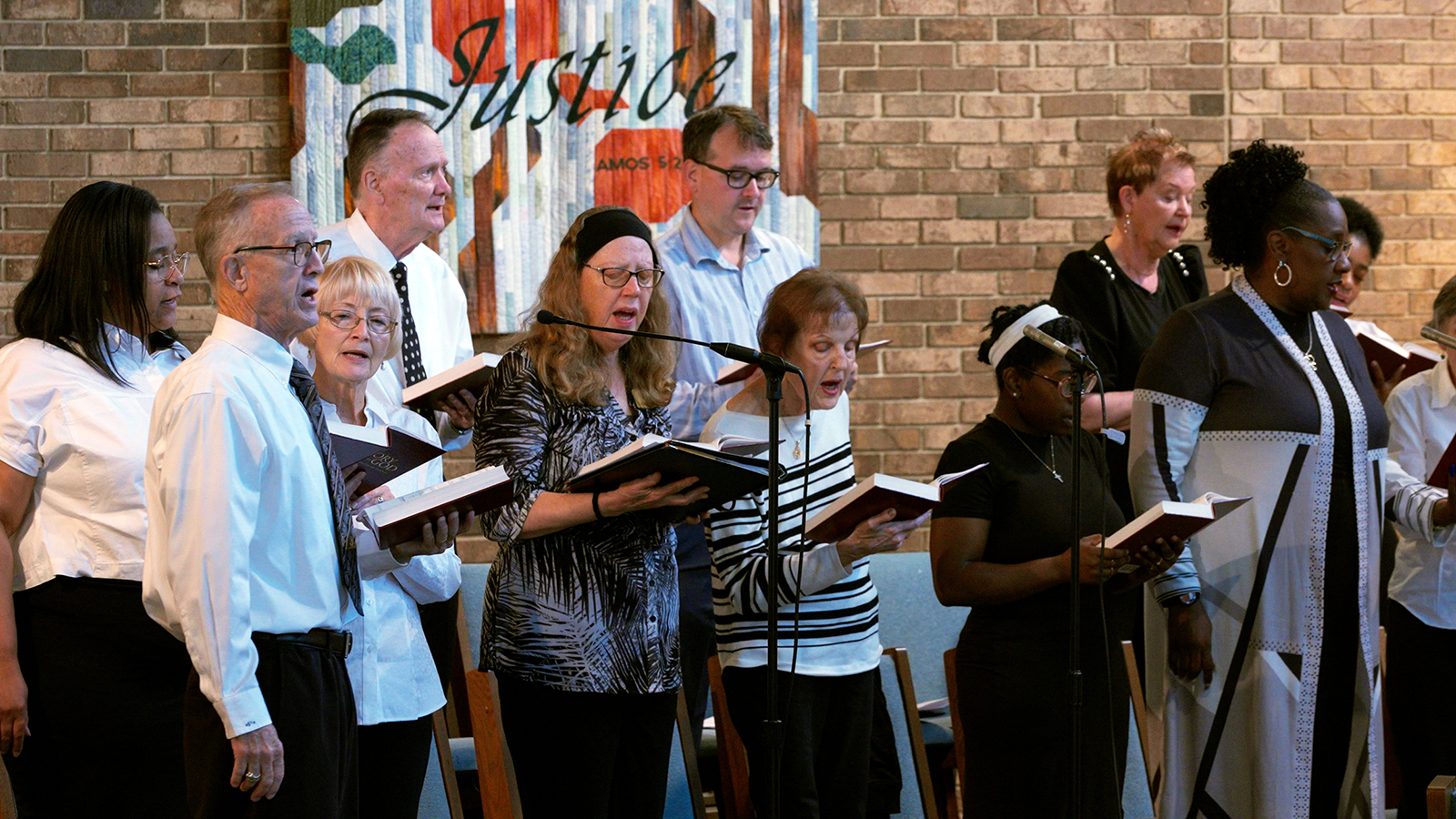
WHEATON, Ill. (Chronicle of Philanthropy) — Every Sunday, Jacquetta Carter sets off on an unusual religious journey. Leaving her home in a middle-class neighborhood of Joliet, Illinois, Carter and her husband, Keith, drive 45 minutes north, through other western Chicago suburbs and into this relatively affluent community. Their destination, Hope Presbyterian Church, sits on a small hill surrounded by large homes set on expansive, neatly trimmed lawns.
At the church, the Carters, who are Black, slip into the pews of the predominantly white congregation. Worship is reserved, even solemn — Hope members jokingly describe themselves as the “frozen chosen.” The Baptist-raised Jacquetta, however, chafes at the quiet. “Come on, Pastor,” she cries out in the call-and-response she’s accustomed to, even if hers is the only voice raised. Indeed, she can seem so out of place at Hope that police once stopped her outside the church and questioned what business she had there.
Still, Carter, 45, has found in the church a place where she can be herself and be loved for it. “It has become a family for me,” she said. “It has become more of a family than my own family.”
Hope is part of an unusual partnership. About a decade ago, it invited Bethel New Life, a new predominantly Black church rooted in Baptist doctrine and tradition, to share its building for a modest rent. And last year, the two congregations began to share the same pastor, the Rev. Ron Beauchamp, Bethel New Life’s Black leader.
America is navigating many divides — the chasm between MAGA and liberal, Black people and white people, rural and urban. Hope and Bethel, meanwhile, are trying to bring people together across a trifecta of division — faith, race, and, in some instances, class. And they’re trying to bridge differences without help from foundations or experts; a grant request was turned down.
They still worship separately — Hope in the morning, Bethel New Life in the afternoon, with the Carters attending both. But Beauchamp and others are trying to fuse the two into a community and, perhaps, even into a single church. Their journey is a test of the unifying power of a belief in God, with thorny questions about identity and compromise.
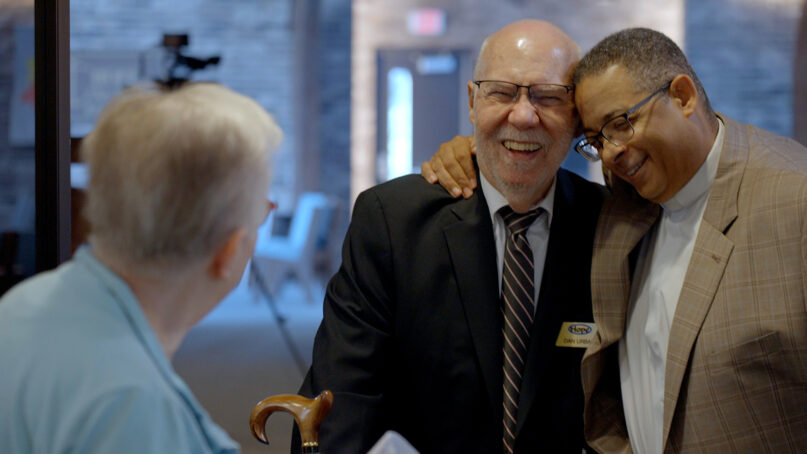
The Rev. Ron Beauchamp, right, visits with parishioners in Wheaton, Illinois. (Alex Garcia for The Commons/Chronicle of Philanthropy)
Beauchamp, the 57-year-old Illinois native at the center of this experiment, has a smooth, round face, a lovely tenor voice and an office adorned with diplomas. “He’s got more degrees than I have wheels on my car,” said the Rev. Jay Moses, Beauchamp’s predecessor as Hope pastor.
Beauchamp considers himself an ambidextrous preacher. His mother was Baptist, his father Methodist, his grandfather Catholic. His wife is Pentecostal. Growing up, he attended the Sunday morning service at the Lutheran church whose school he attended. In the afternoon, he worshipped a second time at his mother’s Baptist church. As an adult, he’s taught and worked at majority white colleges.
Each week, Beauchamp leads the two very different congregations in two very different services. One recent Sunday, the Presbyterian service opens just after 10 a.m. with announcements and the 17th-century hymn “From All That Dwell Below the Skies,” an out-of-practice substitute accompanist gamely plucking out the chords on a piano. The worship then marches dutifully through the liturgical elements — the call to worship, the call to confession, the confession, the doxology. With each, the congregation plays its part somberly, its tone steady even as language and punctuation call for exaltation:
Leader: God’s greatness is beyond our understanding, yet we proclaim …
People: Bless the Lord, O my soul!
Everything wraps up within an hour. “Any longer and they will get restless,” Beauchamp said.
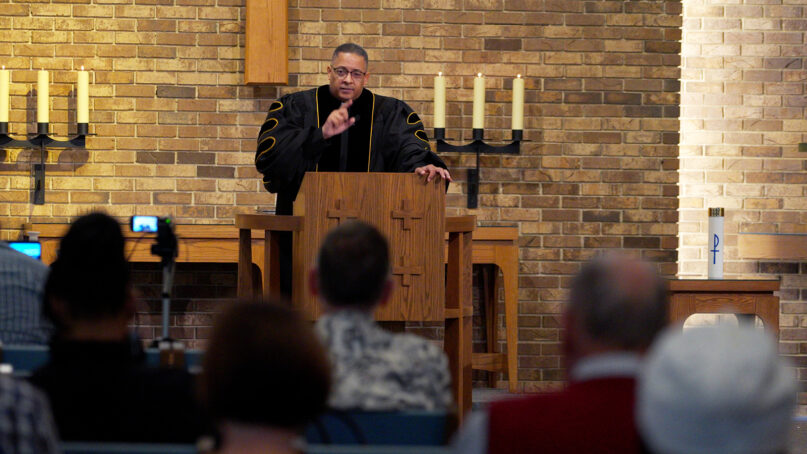
The Rev. Ron Beauchamp now pastors both Hope Presbyterian and Bethel New Life churches in Wheaton, Illinois. (Alex Garcia for The Commons/Chronicle of Philanthropy)
Bethel New Life’s service starts at 1 p.m. with “an explosion” of sound and energy, as Carter describes it. A choir sings and sways to a sonic boom of gospel music from a praise band — electric organ, drums, tambourine. The sound echoes throughout both floors of the building.
The bulletin for the service lists few details — no hymn names, no mention of the Bible verses to be read. Things wind down after about 90 minutes, though services can run as long as two-and-a-half hours.
Beauchamp preaches from Psalm 91 at both services but has written a different sermon for each, as usual. For the Presbyterians, he offers a lecture-like disquisition on what it means to have confidence in God. He mixes in references to Jimmy Stewart and the Chicago Bears, drawing a few chuckles. But as he approaches the end and asks, “Does anyone know what I’m talking about?” he’s met with silence. Congregation members aren’t interested in dialogue during worship, he said. “That freaks them out.”
Beauchamp’s afternoon sermon, meanwhile, is part performance — Bethel New Life expects “volumes of energy and movement,” he said — and part conversation with his flock. “They like to hear their name mentioned,” he said. “‘Did you hear the pastor use me in his sermon today?’”
His voice shifts easily from near whisper to a roar, from encouragement to a scolding challenge: “I’ve been wondering for a while: Who do you really follow? … I’m looking for your faith to come alive.”
Circumstances threw the two congregations together. Bethel New Life opened a decade ago, meeting at a hotel’s conference room. Beauchamp was acquainted with Moses, Hope’s pastor at the time, and asked if the church could share space. Hope, which already provided a home to a Sikh group, agreed.
Initially, the two congregations had little to do with each other. “There was a coldness on both sides,” Beauchamp said.
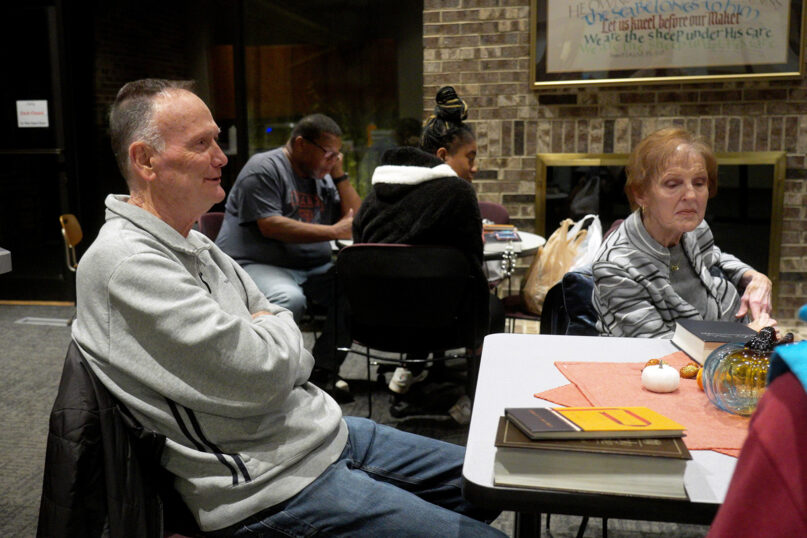
Glenn Stith attends a join bible study with members of Hope Presbyterian and Bethel New Life churches in Wheaton, Illinois. (Alex Garcia for The Commons/Chronicle of Philanthropy)
Both churches recognized their differences and worried about how they would be accepted in gatherings or joint worship, said Glenn Stith, an 82-year-old former oil-company executive. He and his wife, Suzan, who are white, have attended Hope for nearly 50 years, since services took place in a farmhouse. “When they came here, there were certain feelings of not knowing what to expect from one another and how we might get along.”
Carter was shocked at her first Hope service to discover she and Keith were the only Black people in the pews. Even when the congregations mixed, Hope members didn’t show the warmth that she expected in a church. “They didn’t want to touch us. They didn’t want to hug.” It was, she said, “like there was a wall between us.”
Most Bethel New Life members don’t live in Wheaton — Black residents make up only 3% of the city’s population — and several report troubling encounters with local police. One Saturday morning, as Carter arrived to open the church for her praise dance group to practice, police rolled up almost immediately. Officers blocked her from entering until they could phone someone to confirm she was allowed.
Said Carter: “There were plenty of times that I went and asked pastor, ‘Why have you got us out here?’”
Relations between the two churches warmed over time. After the 2020 murder of George Floyd, Hope members erected a Black Lives Matter sign at the church, and a second one when vandals tore it down. Beauchamp and Hope pastor Moses rode a trolley car with a BLM banner to other churches that joined in a pledge to make the world a better place.
Like much of the country, the two churches made efforts at racial reconciliation. A study of Robin DiAngelo’s “White Fragility” didn’t land well, but relationships and mutual understanding grew through a joint series of discussions about race. Carter shared about having her first child at 16 and described how she stuck with a job for its steady paycheck despite overt racism.
“It was just getting to know each other and finding out that even though we look different, we’ve come from different backgrounds religiously, spiritually, financially, that there are things that make us still similar,” she said. “We are all still God’s children, and we’re all still human.”
About two years ago, Beauchamp started a weekly joint Bible study. Although they began with a study of “How to Become a Multicultural Church,” members say it was more important to build friendships and share in the challenges and joys of daily life.
The Stiths joined the Bible study and immediately felt a connection with Bethel New Life members. “I remember in those first few weeks noticing how good we felt when we left,” Glenn said.
Sheri Clubb, 70, has been at Hope since the mid-1980s. She’s white and grew up in the predominantly white Chicago suburb of Arlington Heights. “We had one Black student in my high school,” she said. She went on to become a teacher and taught for many years at a racially diverse school in a low-income neighborhood. But she never had a Black friend until she joined the Bible study.
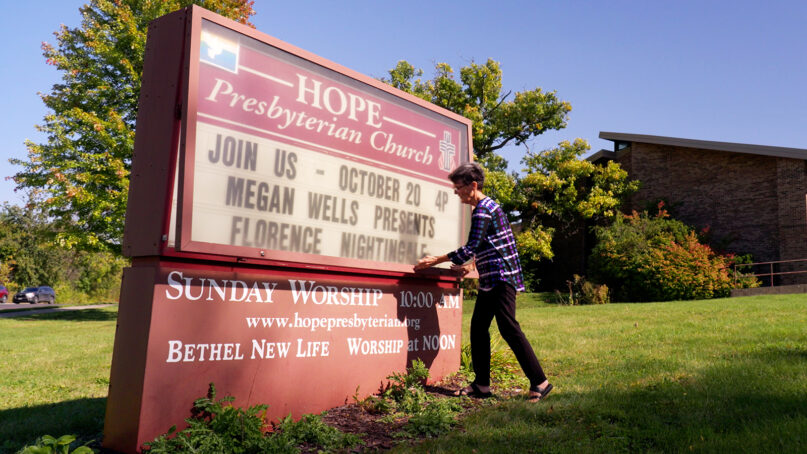
The sign is updated for Hope Presbyterian and Bethel New Life churches in Wheaton, Illinois. (Alex Garcia for The Commons/Chronicle of Philanthropy)
“I’ve learned a lot through the Bible study about the challenges that people at Bethel have had because their skin is black,” she said. “I ignorantly thought that was not an issue anymore. I was clueless.”
Clubb and her late husband and two kids had joined Hope because of its strong sense of community and the way members made them immediately feel like they belonged. In the Bible study and casual conversation, she learned that Bethel New Life members felt they hadn’t been extended the same welcome. She had believed Hope was like the model described in “How to Become a Multicultural Church.” “But I think we have some ways to go.”
In 2022, Moses left Hope for a congregation in suburban Maryland. The search to replace him dragged on for more than a year. Beauchamp served as a guest preacher with others and said that he wanted to step in full time. He was trained in a seminary affiliated with the American Baptist Churches, which like the Presbyterian Church (U.S.A.), belongs to the World Council of Churches.
As products of the Protestant Reformation, Baptist and Presbyterian theologies share much in common. Their adherents believe that a person is justified before God only through faith in Jesus. Both hold that the Bible is the infallible word of God. Communion and baptism are integral and sacred. (Presbyterians baptize infants; Baptists reserve baptism for those who profess their belief in Jesus as their savior.)
The Chicago Presbytery, which oversees 81 churches in the region, approved Beauchamp after a formal interview — “It was like 17 people on a Zoom,” he said — and some training. The Rev. Craig Howard, leader of the presbytery, was initially skeptical. Bringing the two congregations together would be hard, if not impossible. Tensions of race and class cut through Chicago’s history and everyday life, said Howard, who is Black.
Beauchamp, however, was eager to build bridges across those divides and seemed well equipped given his time in Black churches and in largely white colleges. “He’s not coming in here to jam either culture down either person’s throat,” Howard said.
Howard also saw a chance in the Hope-Bethel relationship to lower the walls that divide Christian denominations. “In a perfect world, I would want to see one congregation,” he said. The best future for the two churches “would be a beautifully blended congregation that, frankly, would care less and less about denominational affiliation because that truly is the future of the church.”
If Hope’s Presbyterian identity becomes a roadblock, he said, “we just have to have the conversation of what that will look like.” He adds, “I gave up years ago on the concept of Presbyterians winning the day.”
Beauchamp became Hope’s pastor in February last year. He phoned every member and at church warmly greeted them with hugs and smiles. “They don’t want a big, burly Black man coming up and being aggressive. What they want is somebody who they felt they could talk to, that they could trust.”
A few months ago, the congregation gave Beauchamp high marks in an evaluation. His contract was extended through the end of this year. Hope members particularly appreciate his pastoral care, which Clubb said is generous and loving. “He’s the epitome of caring — he truly is.”
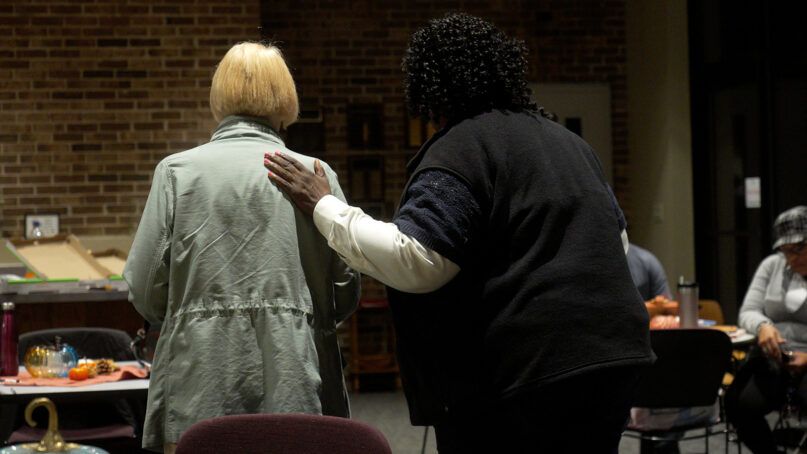
Hope Presbyterian and Bethel New Life church members together in Wheaton, Illinois. (Alex Garcia for The Commons/Chronicle of Philanthropy)
Tensions remain, including over the question of whether the two churches merge and worship as one. Each has fewer than 75 members and is fighting the spiraling decline that has pulled many churches under. “Those people on that little hill need each other,” Moses said. “The challenge and the hope is that they would come together.”
But Beauchamp and Hope leaders say merger is not something they will pursue any time soon. A union would likely face more acculturation challenges than doctrinal disagreement. Would there be gospel music or traditional hymns? Could a mix satisfy anyone? Would call-and-response worshippers have to restrain themselves and the “frozen chosen” give up the structure they like?
Ultimately, both churches would have to give up something, and many are afraid to lose elements of their faith identity. “There would have to be a lot of compromises on both sides,” Clubb said, “and I’m not sure those compromises could happen.”
Since taking over Hope, Beauchamp has encouraged more joint services, including at Christmas. “I believe we need to learn how to worship here together so that we can get ready for what it’s going to be like in heaven,” he said. The planning for Hope-Bethel combined worship requires each congregation to sacrifice something — not an unreasonable expectation, Beauchamp said, for a religion based on the sacrifice of Jesus Christ.
“What might I lose in order to gain relationships, friendship, kinship?”
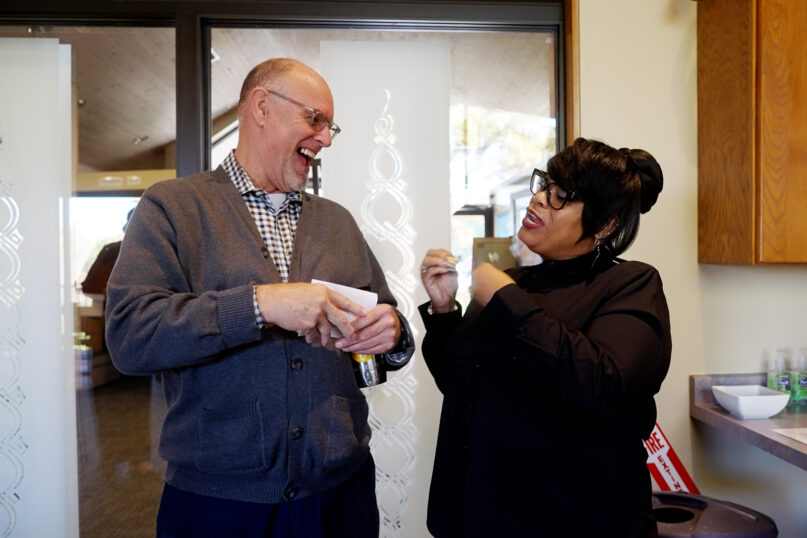
Tom Schmidt, left, and Jacquetta Carter talk at the shared campus of Hope Presbyterian and Bethel New Life churches in Wheaton, Illinois. (Alex Garcia for The Commons/Chronicle of Philanthropy)
Jacquetta Carter serves as a bridge between the two congregations. She’s a presence at both services each Sunday, taking notes from Beauchamp’s sermons and chatting with members of both congregations during the coffee hour in between. Whereas Bethel and Hope members once stood on opposite sides of the room, they mingle more now, she said. “We have grown tremendously.” Despite the differences between members, “we always run into something in common with each other.”
Carter, who grew up an only child, has known hardship. She had her first child at 16, and she spent time with her children in a homeless shelter. While she eventually climbed into the middle class, recent years have rocked the foundations of that status as well as her emotional well-being. Her mother died, then her father a few weeks later. Illness kept Keith, her husband, out of work for nearly a year. Word spread among the Hope congregation, and when she showed up on Sundays, people jumped to help. They brought meals and bought gas for her car. Bills piled up, but she called the utility company one day to find someone had paid their bill.
Carter never expected to become so close to Hope members, particularly at first, when their worship felt so foreign. But God, she said, has his own designs. “The family that I’ve always needed — the family that I always wanted and that wanted me — was here.
“I believe in my heart that God is pleased with what is happening, and what can happen.”
This article was produced by the Chronicle of Philanthropy, where it first appeared.
